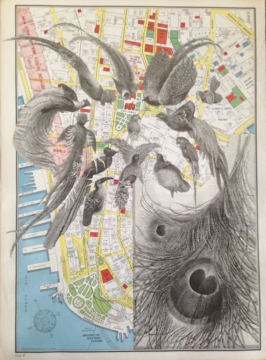Sasha Frere-Jones in Bookforum:
 IN 1998, Lucy Sante published The Factory of Facts, a memoir of her childhood in Belgium and the Sante family’s stuttering moves back and forth (and finally forth) to the States—ultimately, to Summit, New Jersey—when she was eight, in 1962. Toward the end of the memoir, she marks her story as a displacement, “as if I were writing about someone else.” Sante is talking, here, about the French of her youth contrasted with the English of America, and how “languages are not equivalent one to another.” Something else is in play, though. The eight-year-old boy that Sante speaks for would need to translate her English words, written much later in America, “and that would mean engaging an electrical circuit in his brain, bypassing his heart.”
IN 1998, Lucy Sante published The Factory of Facts, a memoir of her childhood in Belgium and the Sante family’s stuttering moves back and forth (and finally forth) to the States—ultimately, to Summit, New Jersey—when she was eight, in 1962. Toward the end of the memoir, she marks her story as a displacement, “as if I were writing about someone else.” Sante is talking, here, about the French of her youth contrasted with the English of America, and how “languages are not equivalent one to another.” Something else is in play, though. The eight-year-old boy that Sante speaks for would need to translate her English words, written much later in America, “and that would mean engaging an electrical circuit in his brain, bypassing his heart.”
The heart could be the same in both languages, yes? But this is not the case. In French, the young Sante feels “naked,” and putting on English is a betrayal. Young Sante pledges that she “would never become one of them,” the Americans who “eat soft white bread” and drink Budweiser. Sante goes on to make a list of what the family lost in the move: friends, connections, habits, belongings. But there is another loss, “a gulf inside me, with a blanketed form on the other side that hadn’t been uncovered in decades.” Sante has reinvented herself and “become a sort of hydroponic vegetable, growing soil-free,” while feeling “self-loathing and rage.” This sounds like more than just an aversion to American football. “Maybe some of what I thought I had lost was merely hidden.”
More here.
